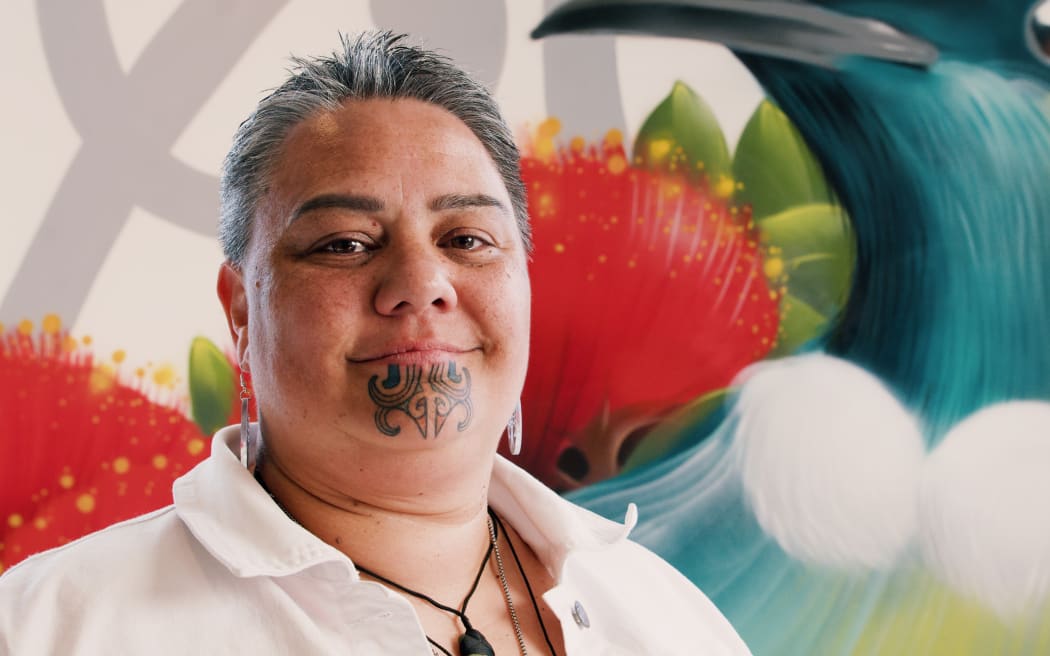Politics
Social Worker Jean Milne Inspires Māori Youth to Embrace Identity

Social worker Jean Milne, a member of Ngāi Tūhoe, is advocating for Māori to embrace their identity and consider careers in social work. Milne describes her role at Oranga Tamariki, specifically within a youth justice team, as her “dream job.” She emphasizes that understanding her Māori heritage has profoundly influenced her approach to working with young people.
Raised in a predominantly Pākehā environment, Milne did not initially identify as Māori. Reflecting on her childhood, she recalls, “I remember, as a child, people would say, ‘You’re Māori,’ and my response was, ‘No, I’m not, I’m Pākehā.'” This perception changed dramatically when she began her studies in social work at Te Wānanga o Aotearoa in 2020.
A Journey of Self-Discovery
Milne describes her enrollment as a pivotal moment in her life, sparking her ‘ko wai au’ or ‘who am I?’ journey. On her first day, she witnessed her peers introduce themselves through their pepeha, or tribal affiliations. “All this beautiful kōrero of where everyone’s from, and I just came up with ‘I am Jean’,” she reflects. This experience highlighted her need to reconnect with her roots.
Her academic journey not only equipped her with the skills required for social work but also encouraged her to explore her whakapapa, or genealogy. “The holistic Māori worldview changed how I practise social work,” she notes, explaining that her methods are now more inclusive and culturally sensitive.
Prior to entering social work, Milne spent decades in retail and hospitality. Her path shifted when she encountered a stall promoting caregivers at Te Rā o Te Raukura, leading her to care for high-needs rangatahi, or youth. Encouraged by someone who suggested she pursue a social work qualification, Milne signed up for the Bicultural Social Work Certificate, ultimately leading to her current position.
Reclaiming Heritage and Identity
Milne’s journey of reclamation was further catalyzed by a significant personal event: the tangi, or funeral, of her grandfather. Surrounded by family she had never known, she realized how disconnected she had been from her Māori identity. “It showed me there was this whole world I’d been disconnected from, even though it was still connected to me,” she explains.
Learning about core Māori concepts such as whanaungatanga (kinship) and manaakitanga (respect) deepened her understanding of her identity, making her realize that she is part of a broader lineage. “I’m Jean, who comes from people, from tūpuna, even if I didn’t grow up knowing them,” she states.
Milne’s transformative journey continued as she committed to receiving a taonga, her moko kauae, upon graduation. Initially, she grappled with feelings of being “too Pākehā.” However, encouragement from friends helped her embrace her Māori identity fully. “This is my journey—it’s not my whakapapa journey, it’s my journey into who I am today,” she asserts.
On the day of her graduation, she chose to reveal her moko kauae at Oranga Tamariki in Lower Hutt, marking a significant milestone in her personal and professional life. “It felt like everybody was here, even though some whānau couldn’t make it,” Milne recalls, feeling the presence of her ancestors during this pivotal moment.
Now, as part of the youth justice team, Milne finds her work deeply fulfilling. She describes the initial resistance she faces from many rangatahi, who often view her with skepticism. Yet, by the end of their interactions, they often embrace her, calling her “auntie.” “That’s when I know my mahi has made a difference,” she says, reflecting on the impact she has on young lives.
Milne’s journey serves as an inspiration for others, particularly those within the Māori community. She encourages individuals to pursue their own paths of reclamation, stating, “It’s never too late to pursue who you are. Never be whakamā [ashamed] about yourself.” Her story highlights the importance of embracing one’s identity and the unique perspective Māori can bring to social work.
In light of her experiences, Milne hopes to motivate more Māori to enter the field of social work, emphasizing its significance. “We need more Māori, wāhine, and tāne, because we bring a different perspective,” she advocates.
-

 World1 week ago
World1 week agoPrivate Funeral Held for Dean Field and His Three Children
-

 Top Stories2 weeks ago
Top Stories2 weeks agoFuneral Planned for Field Siblings After Tragic House Fire
-

 Sports3 months ago
Sports3 months agoNetball New Zealand Stands Down Dame Noeline Taurua for Series
-

 Entertainment3 months ago
Entertainment3 months agoTributes Pour In for Lachlan Rofe, Reality Star, Dead at 47
-

 Entertainment2 months ago
Entertainment2 months agoNew ‘Maverick’ Chaser Joins Beat the Chasers Season Finale
-

 Sports3 months ago
Sports3 months agoSilver Ferns Legend Laura Langman Criticizes Team’s Attitude
-

 Sports1 month ago
Sports1 month agoEli Katoa Rushed to Hospital After Sideline Incident During Match
-

 World2 weeks ago
World2 weeks agoInvestigation Underway in Tragic Sanson House Fire Involving Family
-

 Politics2 months ago
Politics2 months agoNetball NZ Calls for Respect Amid Dame Taurua’s Standoff
-

 Top Stories2 weeks ago
Top Stories2 weeks agoShock and Grief Follow Tragic Family Deaths in New Zealand
-

 Entertainment3 months ago
Entertainment3 months agoKhloe Kardashian Embraces Innovative Stem Cell Therapy in Mexico
-

 World4 months ago
World4 months agoPolice Arrest Multiple Individuals During Funeral for Zain Taikato-Fox



















